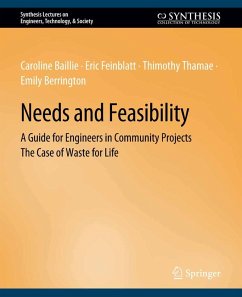Needs and Feasibility: A Guide for Engineers in Community Projects -- The Case of Waste for Life is the story of Waste for Life (WFL). WFL is a not-for-profit organization that works to promote poverty-reducing solutions to environmental problems, and its educational branch is an international consortium of universities in six countries, involving students in support of community development projects. WFL currently works in Lesotho and Argentina. We present the story of the development of WFL in each country as a case-based guide to engineers, professors and students interested in community development work, particularly in contexts very different from their own. We focus mainly on the set-up stages, framing the projects to ensure that community needs are adequately articulated and acted upon. We begin with needs assessment, what is it that needs to be done -- for whom and why? How feasible is this, technically, economically, and can we guarantee sustainability? Before we can decide any of this, we need to understand and map the territory -- who are the key players, who have the most influence, and who will be most impacted by what we are doing? What is the role of the local government? If the groups are working as cooperatives, what does this mean, and what are these groups looking for? What is the technical solution going to look like? If it is a product, how will it be marketed? What other social, environmental, and economic impacts will it have and on whom? Once these have all been negotiated, and it is clear that all parties are working towards a mutually acceptable goal, how do we move forward so that any dependence on external partners is removed? When do we bring students into the work? What role can they play? Should they stay at home and support the project from there or is it better to do work in the field? This guide will be useful for the student engineer or the experienced engineer or professor who is interested in moving towards socially just engineering development work but has no idea where to begin. The real difficulties and on the ground issues encountered by the Waste for Life team are presented honestly and with the knowledge that we must learn from our mistakes. Only then can we hope to gain a better understanding of our potential role in supporting community development and move towards a better future. Table of Contents: An Introduction / Assessing the Need in Lesotho / Feasibility of WFL Lesotho / Mapping the Territory in Buenos Aires / Stakeholder Focus: The Local Government / Stakeholder Focus: Cooperatives / Sustainability: Economic, Environmental, and Social / Student Involvement / Summary Thoughts
Dieser Download kann aus rechtlichen Gründen nur mit Rechnungsadresse in A, B, BG, CY, CZ, D, DK, EW, E, FIN, F, GR, HR, H, IRL, I, LT, L, LR, M, NL, PL, P, R, S, SLO, SK ausgeliefert werden.


